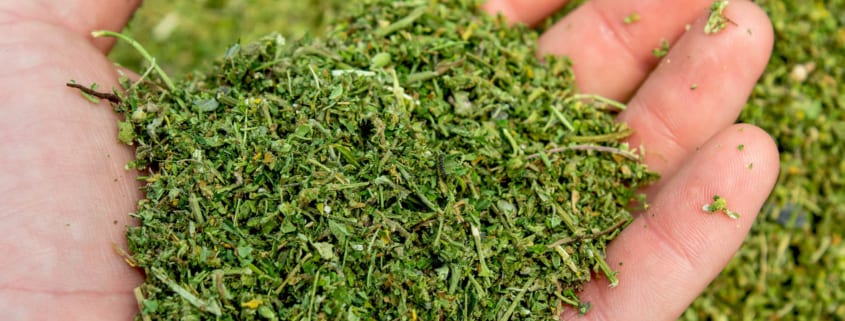Whether you are growing hemp flowers for cannabinoids, or industrial hemp for stalks, being able to sell your harvest is critical for success. In both the CBD hemp and industrial hemp verticals, selling your hemp as biomass is a great way to turn a profit early in the hemp supply chain. By selling in bulk, you can avoid many of the expenses and headaches that come with vertical integration or product development.
When it comes to selling your crop, you’ve got a range of options, from working with a hemp broker, to selling directly to wholesale hemp buyers, or even taking your crop to a tradeshow. Let’s look at the most common ways to sell hemp, and the steps you should take to ensure that you get the best price possible.
What is Hemp Biomass?
Because hemp is such a diverse plant, people have created a number of terms to describe its many applications. The primary differentiating factor for hemp is hemp grown for CBD and industrial hemp. Importantly, CBD hemp is grown for its cannabinoid and terpene rich flowers. Conversely, industrial hemp is cultivated for the strong fibers found within the plants’ stalks. Within these two key categories are other subcategories used to describe different hemp biomass uses.
“Hemp biomass” is a term used to describe hemp plant material at the time of harvest. Within the primary categories of CBD hemp and industrial hemp, the term hemp biomass has multiple meanings.
In commercial CBD hemp production, farmers use the term biomass to describe all the plant material that is harvested and sold. Generally speaking, CBD biomass is grown and sold to be used in CBD extracts. As such, it contains a good deal of stems and fan leaves – as opposed to just flowers.
With industrial hemp cultivation, biomass also refers to all the plant material that is processed and sold. However, industrial hemp biomass refers to the material found in the hemp stalk, such as bast and hurd. Industrial hemp is sold in bulk biomass, where manufacturers then turn different parts of the plant into textiles and other materials.
With both CBD hemp and industrial hemp, the weight of your biomass is used to determine the size of your harvest. When you sell either type of biomass, you will bargain the deal based on the average cost of biomass per in your chosen hemp vertical. CBD biomass is sold by the pound, while industrial hemp biomass is often sold by the ton.
Selling CBD Hemp Biomass vs Industrial Hemp Biomass
There are many differences between selling CBD hemp biomass and industrial hemp biomass.
The customers you will be dealing with in the hemp CBD vertical work within the health and wellness industry. As such, you can expect your prospective clients to be interested in such things as cannabinoid levels, product purity, testing results, and terpene profiles. In essence, these customers are concerned about purchasing hemp that can safely be manufactured into consumable products.
Clients in the industrial hemp vertical have much different business focuses than those in the CBD hemp space. Industrial hemp buyers are looking for specific data related to fiber strength, bast percentage, and retting practices. Even more, they will likely be looking for biomass to be manufactured into a specific product, such as hemp fabric.
Determine the Price of Your Hemp Biomass
You would never sell your truck or a piece of expensive farm equipment without having at least a ballpark idea of how much it was worth, right? The same goes for your hemp crop. Before you start looking for hemp buyers, you need to understand how much your hemp is worth so that you can negotiate the best price for it.
Many factors will affect the value of your biomass, but the major factor is the amount of CBD or CBG your biomass contains. If you grow low-quality hemp plants with, say, less than 10% CBD, then you won’t be able to ask for a high price per pound. On the other hand, biomass with a high percentage of CBD or CBG will be able to garner top dollar.
For industrial hemp, factors that influence the value of biomass include the percentage of bast versus hurd. Hemp bast is the prized, stringlike fiber found on the interior of the stalk. Bast is used to make many of the materials that drive the industrial hemp market, including paper, wood, and clothing. Hurd is the material on the exterior of the hemp stalk that resembles wood chips after it is processed. It is less valuable than bast and is often used to make things like animal bedding and hempcrete.
Pre-Selling Your Hemp Harvest
For many hemp farmers, it’s a good idea to try and pre-sell your hemp harvest before your crop is mature. In fact, it is in your best interest to have a secure contract in place before you ever put seed in the ground. Searching for biomass purchasers early will give you time to do your research on potential buyers, negotiate a fair price, and review the contract before signing. Alternatively, if you wait until your hemp is harvested, you’ll have a short window to unload your crop. You’ll also be competing with other farmers who weren’t able to pre-sell their crop. Biomass buyers will have the upper hand in negotiations.
At the same time, if you decide to pre-sell your crop, make sure you review the contract carefully. Your crop may have to meet certain CBD or CBG percentage standards to qualify for your agreed-upon price. If you are growing industrial hemp, buyers of hemp biomass will expect a certain quality of fibers. You’ll want to understand what happens if you aren’t able to meet the terms of the contract. Will you get a lower price, or will the buyer be able to walk away?
Hire a Hemp Broker
Perhaps the easiest answer to the question of where to sell hemp is to use a hemp broker. A good hemp broker is someone who is highly knowledgeable of the hemp industry, has many contacts in the field, and is a great communicator. A licensed hemp broker will essentially connect you to a buyer and facilitate the sale of your crop. Generally, you can find both CBD hemp brokers and industrial hemp brokers.
In a best-case scenario, a hemp broker will find a buyer for your crop and negotiate a great rate for your hemp. In exchange, the broker will take a commission on the sale, typically around 10% of the sale, though rates can go much higher.
For some farmers, especially first-time hemp farmers without many contacts in the field, a hemp broker can be an excellent option, alleviating the need for a farmer to find and negotiate with a buyer on their own. The broker may also get a higher purchase price than a farmer could achieve on their own, helping to cover their fee.
However, working with a hemp broker might not always be your best option. For example, a hemp broker’s commission can take a notable chunk out of your earnings, especially if your profit margins are thin. Next, for every great hemp broker, there are many less experienced and less scrupulous individuals hawking their services. So before signing on with a hemp broker, be sure to thoroughly vet them.
Sell Directly to a Customer
Farmers who have a lot of contacts in the hemp field and want to earn more by cutting out the middleman may prefer to sell their hemp biomass directly to a customer, typically a processor or extractor. This will require more legwork and a willingness to spend time negotiating on your own behalf. It may also be a good idea to retain an attorney to review any contract you and your buyer draw up together.
Selling directly to a customer can help you maximize your profit, but it will also require more effort on your part. Certain hemp biomass buyers, especially wholesale hemp buyers, may be hesitant to work with a new and unproven farmer or a farmer without an adequate amount of biomass to sell. If you have a knack for sales, it might also be worth visiting hemp trade shows to expand your network of potential buyers.
Sign a Profit-Sharing Agreement
Farmers planting hemp for the first time may struggle with all the costs associated with switching to a new crop. High-quality hemp seeds aren’t cheap, and farmers may have to invest in new equipment, a new irrigation system, and more.
One way to mitigate all the startup costs of planting hemp is to sign a profit-sharing agreement with a biomass purchaser. With this agreement, the buyer covers the upfront costs of growing and harvesting the hemp. Those costs are then recouped through the profit of the crop, and the farmer and purchaser share the additional profits. A profit-sharing agreement may also appeal to farmers who want to quickly grow their hemp operation but don’t have the capital to expand at the pace they want.
It may take some work to find a buyer willing to put up the money for your hemp operation, but if you need fast capital, this could be the right option for you.
Hemp Futures Contracts
Farming always carries some degree of risk. One way farmers seek to mitigate that risk is to sign a futures contract with buyers. This contract is typically signed before a hemp crop is planted and specifies the price per pound the buyer agrees to pay for the crop. Usually, the price offered in a futures contract is less than what the farmer could get on the open market, but it offers the farmer both stability and predictability. Also, crop prices can fluctuate. If there is a glut in the market and crop prices fall, the futures contract can protect the farmer from a volatile market.
Just make sure you review the futures contract carefully and work with a company with a proven history in paying for their contracts.
Other Places to Find Hemp Buyers
These days, farmers may need to get creative when it comes to finding the right buyer for their hemp biomass. A younger generation of farmers are setting up social media accounts on Facebook, Instagram, and LinkedIn where they can connect with buyers and hemp brokers and begin building a valuable network within the industry. Other farmers are experimenting with selling their hemp biomass through online marketplaces.
Do Your Homework on Your Buyer
No matter where you find your hemp buyer, make sure to research them, review your contract carefully, and get your money before you put your biomass on a truck and send it off. The biomass market is still new and, like any new market, there are people trying to take advantage of the unwary. This notion applies to both CBD hemp and industrial hemp.
The hemp market is still maturing, but that doesn’t mean that there are not secure and reputable companies supporting the hemp supply chain. Let us help you navigate that path and don’t forget that a profitable hemp crop starts with high-quality seeds. Contact us today to learn more about our different hemp seed strains.



